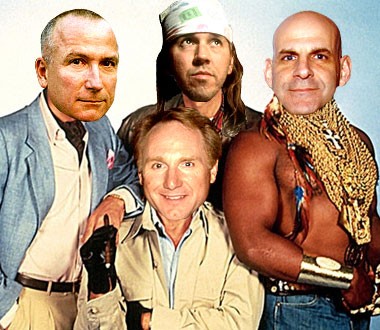 Sarah Weinman
Sarah Weinman- "Why must Brown's villains take extreme vows of celibacy?"
- 09/23/09 at 10:30
I'm going to be the spoilsport who breaks up the parody party Sam and Geoff have gleefully started. Not because I don't have one in mind — even before I cracked open the spine of The Lost Symbol, I had a genius idea to tell the story of a young klezmer musician looking for the secret of superior musicianship in a fraught journey from the bowels of the Lower East Side to the nooks and crannies of beer pavilions in Prague and Krakow and back again in ... The Lost Tsimbl ("where D minor isn't just a key, it's a living"), but let's face it, only one person in the entire universe is fit for the job, and that's based on years-old intel from my Yiddish-singing days. So no parodies for me, not this time around.
Instead, in direct conflict with Brown's narrative style, which may be long-winded but generally sticks to its larger point of Langdon uncovering the Ancient Mysteries of the Universe (which, now that I think about it, sounds like an hour-long TV show I watched on A&E as a kid), I'd rather bring up a couple of random digressive notes for discussion. First up: What the hell was in the water at Amherst in the mid-eighties? There's David Foster Wallace, boy genius, who blew his classmates out of the creative water without even trying (and sometimes with much complaining). There's his roommate (and co-writer on rapper styling) Mark Costello, who didn't fare too badly in the novel-writing department, even if his book reviews tend to err on the side of snotty. There's Harlan Coben, who might have been spooked initially by Wallace's acumen but eventually figured out that his lot in life was to sell a boatload of family-oriented suspense novels. And finally, Dan Brown, the latest bloomer of all, who jettisoned his Sure Hit Songwriter's Pen for the loudest, longest laugh of all. Add in an oversize GMC van and a cigar-chomping George Peppard and we have the A-Team reborn, where A is for Author (or Amherst?).

Photos: Time & Life Pictures/Getty Images; Patrick McMullan; Universal Television
Or possibly we have the real-life and literal version of The Rule of Four, one of the immediate beneficiaries of The Da Vinci Code’s success ... and where's the next book from these guys, anyway?
But let's move on to my next order of business, elaborating further on something I alluded to in my review: Why must Dan Brown's villains take extreme vows of celibacy? I find I am still thinking about this conundrum, in large part because most antagonists in crime fiction are the exact opposite, either raping their victims before killing them (insert any serial-killer novel of your choice here) or at least having their crimes couched in sexual obsession. But the albino assassin in The Da Vinci Code is a self-professed monk; Mal'akh in The Lost Symbol has no need for testicles (never mind that he induces chemical castration). Considering that Brown writes with such earnestness and sincerity about so many other things, like the fate of the free world or Sudoku puzzles or subterranean Masonic hideaways, his celibacy-mutilation complex comes off as all the more jarring.
Finally, I like Geoff's idea that “Dan Brown is America” very much. It is a reminder, too, that Glenn Beck is America, or Jonathan Livingston Seagull is America, or Archie comics are America. Placid on the surface (even Beck has to warm up before he puts on the crazy), but it doesn't take much to scratch and reveal the weird and warped perversity lurking just below the epidermal layer.




